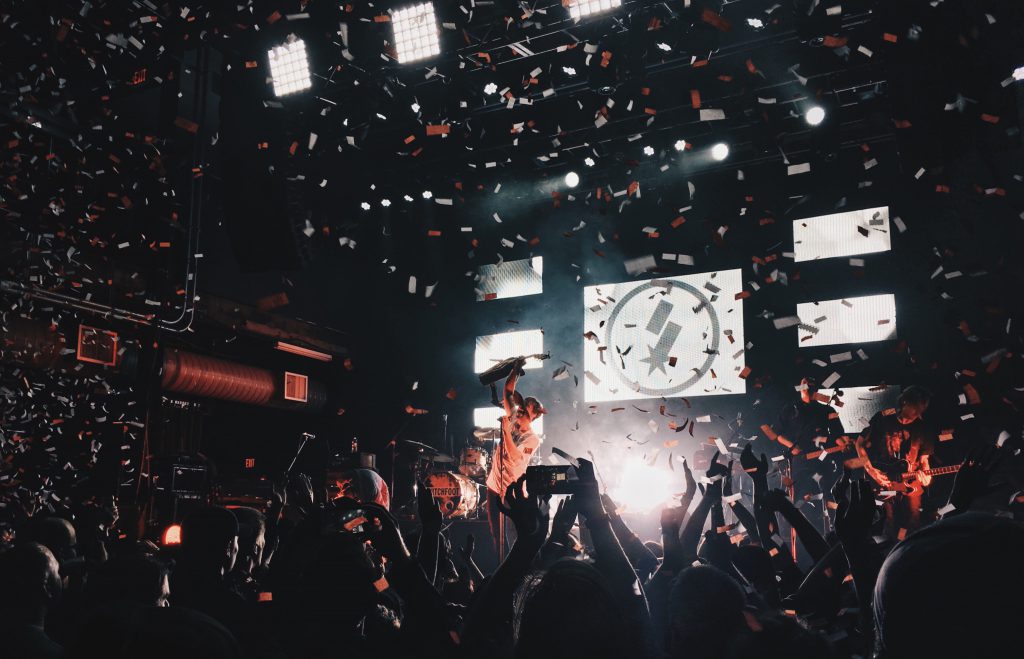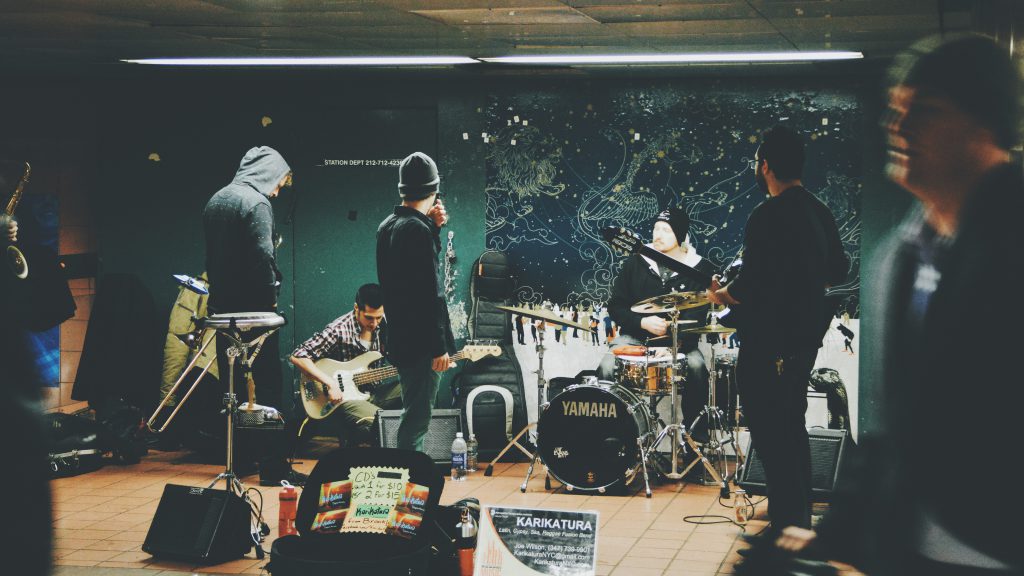A racing heart, dry throat or trembling hands. Most of us know these undesired effects, when performing in public.
Along the way, I have met a decent number of co-musicians and have seen different graduations of stage fright.
I strongly believe, that especially among musicians, it is inevitable. Even the greatest singers like Elvis or Michael Jackson admitted struggling with that anxiety.
One famous musician once said, that when he wouldn’t be scared of playing the masses out there, he would think there’s something wrong.
When the desire to perform still outweighs the fear to fail, we have to find ways and strategies to overcome stage fright when singing and enjoy
In the next paragraphs I’ll give you my thoughts and tips about this important topic.
What is Stage Fright?
Actually, stage fright is considered the biggest fear, even worse than death.
Can you imagine this? What a psychic burden it must be, when people think, they would rather die than perform anything in public?
On a biochemical level, adrenaline is being released and you experience the typical stress symptoms triggered by the sympathetic nervous system:
– Increased heart rate
– Tremor
– Dry mouth
– Sweaty hands
Your cortisol level is lifted and your body is ready to fight or flight.
There have been people who lost the inner fight and stormed off the stage, because they couldn’t stand it anymore.
Statistically, 80% of all people have some kind of stage fright,
From Stone Age To The Stage
If you search the term stage fright, you often come across explanations like “fear of failure”, “lack of confidence”, “Fear of humiliation”. As this might be true to a certain degree, there must be a fear, buried deep inside of our subconsciousness.
After some further research I found something, that made totally sense to me. The root cause of stage fright is the fear of being rated poorly and eventually being excluded from a group. You can track that fear back to the stone age, where exclusion from a group always meant death as you couldn’t survive as an individual.
Today, worst thing that could happen is, people don’t like what you perform or say. But you most likely would survive a disagreement from the audience.
Anyways, that archaic anxiety still exists in many of us and those, who still want to hit the public, have to conquer stage fright.
Use It In Your Favour
Winners always look for the opportunity and not the problem. What only a few realize is, that you can actually benefit from stage fright.
How does that work?
In one of my first articles I wrote about the importance of having the right (muscle) tone when singing.
If the tone is too low, you will have a hard time and struggle with intonation, always being too flat.
So, here’s the good news: Stage fright gives your tone a boost. As mentioned, your body is prepared to fight or flight.
Your truly set up to perform for survival.
If you mentally accept the bad feeling that comes with it, you can take your perfectly toned instrument and give the performance of your life.

When I rehearse for a show and having some trouble with a very high note or tricky passage, I still stay relaxed. From my own experience I’ve learned that, the adrenaline flow before and during the gig will give me the right support to sing it easily.
What Helps
To minimize the negative impact of performance anxiety you can implement following practices:
1) Rehearse like hell
The best remedy I know. Practice your repertoire inside out, so that you only have to open your mouth, when the music starts. You can groove on autopilot through your own performance.

2) Meditate
Regularly meditating will calm your mind and support a more stress-free gig.
3) Visualize
Also a good method to program your mind. Close your eyes and watch a movie of yourself having an awesome performance. See yourself and feel how much you enjoy singing in front of other people. Let the audience give some standing ovations at the end.
4) Prepare mentally: Positive self-talk
Take on that habit of a positive self-talk. Focus on positive things like “I highly enjoy singing in public” or “Singing in front of other people give me pleasure and motivates me to give my best.”
5) Focus
Right before entering the stage, focus on what you’re about to do in the next 10 – 120 minutes.
6) Repeat Performing
The more you perform, the more natural it will feel for you. If you have experienced positive reaction of the audience a couple of times, your confidence will grow continuously.
7) Medication
If none of the above helps or your stage fright is tremendous, I would recommend trying passion flower, rescue drops or CBD.
Not everything works for everyone, but all three remedies have been proven to be effective.
Bad Ideas
Boozing Even though a sip of your Prosecco won’t do you no harm, I personally would avoid conquering stage fright with a bottle of Whiskey. Even tipsiness will weaken your vocal performance, when still thinking you’re doing great.
Even though a sip of your Prosecco won’t do you no harm, I personally would avoid conquering stage fright with a bottle of Whiskey. Even tipsiness will weaken your vocal performance, when still thinking you’re doing great.
Cancelling
Whatever comes, don’t give in to your fear. You rather fight than flight.
Doing it just one time, you will never go back to stage again.
Conclusion
Stage fright is very common especially among singers and musicians. The moment, when everyone looks at you scares some people to death.
Knowing it is a relict from evolution rather than your own weakness can sometimes help.
With the right mindset, you can actually turn the tables and make stage fright work for you.
If you aim to actively go against stage fright, there are some proven strategies in place.
Extensive rehearsing, mental training methods like visualizing or positive self-talk, as well as retaining focus will help you tame the beast of performance anxiety.
Let me hear about your own experiences with stage fright and the strategies I described.
Yours sincerely,
Felix

Hi Felix. Wow what a fantastic article. very useful, especially the tips on how to overcome this dreadful situation. If I ever take up singing I will no doubt be back. Good luck and best wishes Matthew.
I love to sing since I was a little kid, however, I can only sing when in a group and I cannot do it by myself. I discovered my stage fright. I will surely teach my kids these tips so they wont be like mommy. Thank you for sharing!
I have come across stage fright several times in my life but have learnt to use it to my advantage.
In my early years and doing a performing arts degree Zi spent many evening scaring the rest of the cast by threatening not to go on. I felt sick and full of anxiety but I always went on and always gave my best performance.
In later years as a training consultant I also had the same fears but after a time, Zi Just became comfortable with a group of 12 strangers and making them my friend within the first half an hour. This was required to ensure they trusted and learnt from me. Though not a musical performer I found your post really useful.
With Grace and Gratitude
Karen
Thanks for sharing your story Karen and well done!
Hey Felix, are you a vocal coach?
I agree that rehearsing is a top practice. Knowing your stuff brings confidence. Plus you aren’t as stilted, you are free to relax with the audience.
Thanks for commenting Tina. Great to hear that you agree on the rehearsing topic. For now, I’m primarily sharing my singing experiences here on myvocalskills.
Thanks for your tips about how practice can always help enhance performance and how visualizing an awesome performance can help benefit it. My uncle needs to give a speech at his work and he would really like to get some help to present it. He would like to get some help battling it by reading some books and doing research.